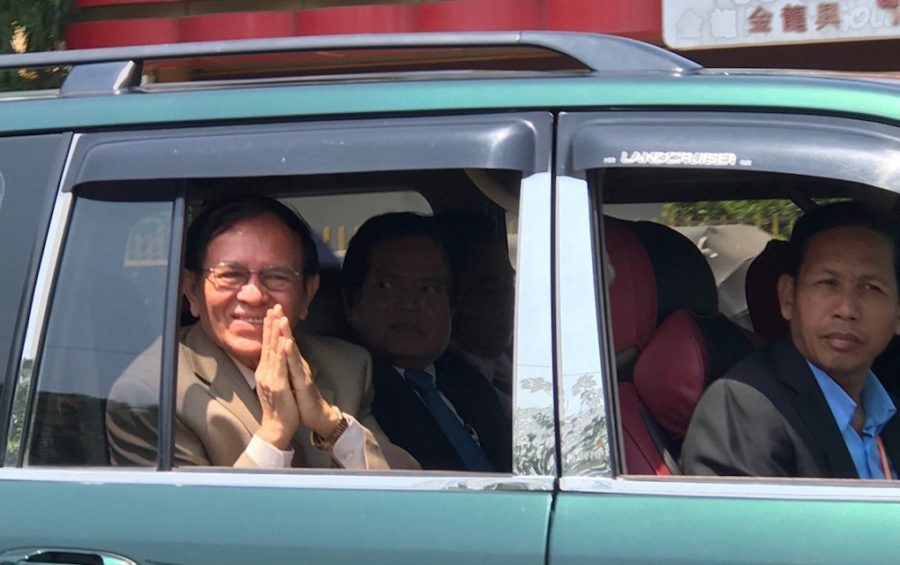UPDATED 11:05 a.m. — Lawyers for Kem Sokha and the government on Thursday debated whether new evidence introduced by prosecutors should be permissible, with the defense arguing that if additional evidence was still needed, there was not enough to find Sokha guilty.
Sokha, leader of the dissolved opposition CNRP, is accused of conspiring with the U.S. to overthrow the Cambodian government. He faces up to 30 years in prison if convicted.
The twelfth day of his trial began with prosecutors requesting to submit seven video clips with transcripts as new evidence.
Defense lawyer Chan Chen spurned the move, claiming that the prosecutors were violating the Criminal Procedure Code — a claim they rejected. Chen said the court had already spent two years investigating the case after Sokha’s September 2017 arrest.
If the prosecutors thought that the investigation was not complete, they should have made a request to submit evidence before the investigating judge forwarded the case to trial last year, according to Chen.
“At this stage, submitting evidence by the prosecutor is not right,” he said.
“If the prosecutor submits additional evidence [now], it means that the charge was made without complete [evidence],” Chen added. “This shows that my client is not guilty. If he is not guilty, the court should drop the charge against him.”
Deputy prosecutor Vong Bunvisoth said they brought the new evidence in response to other items presented earlier by defense lawyers.
Among the evidence introduced by prosecutors, Bunvisoth described a segment from U.S.-funded broadcaster Voice of America (VOA) about the formation of the CNRP in 2012 and a video from the post-election Veng Sreng Boulevard labor protests in 2013.
Evidence introduced by defense lawyers during the first week of February included videos showing Sokha’s past political activities, including 2017 commune election campaign speeches, as well as photos of meetings between CNRP and ruling CPP officials.
Prosecutors and the defense lawyers on Thursday also debated the meaning of Article 321 of the Criminal Procedure Code, which says that all evidence in criminal cases is admissible, unless otherwise required by law.
Government lawyer Ly Chantola said he supported the prosecutors’ move to submit fresh evidence, arguing that there is no law banning any party from submitting evidence during the trial.
“There is no [article of the law] restricting the rights of plaintiffs or prosecutors,” Chantola said.
Defense attorney Meng Sopheary, however, claimed that this article of the law referred to the right of the plaintiff and the accused to submit evidence, not the prosecutors.
Sopheary said that the prosecutors’ attempt to introduce new evidence now cast doubt on whether they were confident of the evidence against Sokha, adding that the move would benefit Sokha’s case.
During the debate, Plang Sophal, another deputy prosecutor, suggested that the defense counsel should review the criminal procedure law, while Chen, a defense attorney, said that the National Assembly and Justice Ministry should clarify the meaning of the law.
Sophal, however, said lawyers should interpret the law as it is written.
“Prosecutors follow the law and do not work based on feelings,” he said.
The judge had the right to decide if the court would accept the evidence, Sophal added.
Presiding Judge Koy Sao did not decide whether he would accept the prosecutors’ new submission of evidence during the hearing.
Sao did, however, address a request from defense lawyer Ang Udom to call foreign nationals who are accused of conspiring with Sokha to the court for questioning.
Sao told Udom to stop making the request, stating that the court was prevented from calling foreigners under Articles 27 to 32 of the 1961 Vienna Convention on Diplomatic Relations.
The convention says diplomatic agents will not be held liable to any form of arrest or detention and “enjoy immunity from the criminal jurisdiction” of the host nation, as well as from its civil and administration jurisdiction in many cases.
“A diplomatic agent is not obliged to give evidence as a witness,” the convention says.
Still, Sao said the court was not afraid to call foreigners so as long as they accepted the court’s jurisdiction, swore to tell the truth in court, and accepted punishment under Cambodian law if found guilty.
During Wednesday’s hearing, Sokha was questioned about whether foreigners, including former U.S. secretary of state Hillary Clinton, had mediated the merger of Sokha’s Human Rights Party and the Sam Rainsy Party to form the CNRP. Sokha denied any involvement by foreign nationals in the creation of the CNRP.
Current and former U.S. officials mentioned in court documents or during the trial, which began in mid-January, include Samuel Downing, former U.S. Embassy political officer; Daniel Baer, former U.S. State Department official; Ed Royce, former U.S. representative; U.S. Senator Ted Cruz; and Clinton.
Baer, who is now a senior fellow at the Washington, D.C.-based Carnegie Endowment for International Peace think tank, said on Twitter on Thursday that he’s been following the trial proceedings.
“My conversation topics with #KemSokha were the same things that I raised with Hun Sen’s regime: the importance of freedom of association, expression and other universal human rights,” he said.
In January, Baer said in a post that he and Sokha had discussed the importance of NGOs being “allowed to do their work,” noting that the government at the time was pushing a “vicious anti-NGO law.”
Judge Sao on Thursday said trial hearings would resume on March 11 and 12, and did not explain why hearings would not take place next week.
Updated at 11:33 p.m. 27 February 2020 with comments from Daniel Baer.
Correction 11:05 a.m. 28 February 2020: The article has been corrected to note that deputy prosecutor Vong Bunvisoth said prosecutors brought new evidence in response to evidence presented earlier by defense lawyers, not defense and government lawyers.












